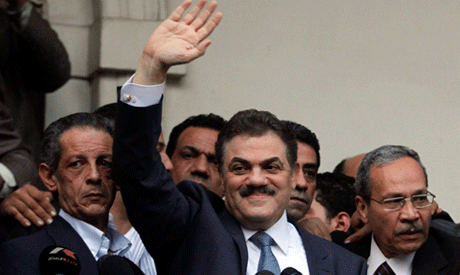
After being heavily criticised for signing an agreement on Saturday with Egypt’s ruling Supreme Council of the Armed Forces (SCAF), political parties met with the council a second time on Sunday night to reiterate their demands.
Following the three-hour meeting, held at Wafd Party headquarters on Sunday, representatives of 60 licensed political parties and movements called for an end to Egypt’s longstanding - and recently reactivated - emergency law. They also asked for the implementation of a treason law intended to ban members of the now dismantled National Democratic Party (NDP) of ousted president Hosni Mubarak from running in elections.
Party representatives also demanded that that SCAF, in tandem with police forces, adopt measures aimed at ensuring public safety without infringing on citizens’ political rights.
The meeting came one day after a smaller meeting between 13 political parties and the SCAF that yielded a written agreement between the two sides regarding some of the more controversial issues to have emerged during the current transitional period. With the exception of the Social Democratic Party, all parties in attendance signed the agreement.
Critics from across the political spectrum, including members of some parties that attended the meeting with SCAF on Saturday, however, blasted the deal, saying that it failed to even fulfil parties’ key demands for democratic reform.
In an effort to placate critics, Mohamed Morsy, leader of the Freedom and Justice Party (FJP) - the political arm of the Muslim Brotherhood - described Sunday’s meeting with the SCAF as “very successful,” citing several achievements. These, he said, included an agreement by the council to amend the much-debated Article 5 of the elections law to allow political parties to field candidates for the one third of parliamentary seats previously reserved for independents.
The military council, Morsy added, had also agreed to provide timetables for the transition of power to a democratically elected civil authority and for setting up a constitutional committee mandated with drawing up a new national charter. The council, said Morsy, had also agreed to announce specific dates for presidential elections, slated for sometime next year.
“We gave an accurate presentation of our demands,” Morsy said, many of which, he noted, had been met by the SCAF. “The council agreed to cancel Article 5 of the elections law and granted political parties the right to run for seats previously reserved for individual candidates. It also agreed to announce a timetable for the transition to an elected government.”
Morsy went on to explain that the council had said that the first round of parliamentary polling would be held at the end of January, and not in March as had been previously announced. He also noted that the SCAF had agreed to ban members of the former regime from participating in political life - a long-time demand of revolutionary forces - and to set a two-year ban on all members of the NDP-dominated 2010 parliament and Shura Council, along with leading members of the now-defunct party.
Morsy added that the alliance planned to provide the SCAF with a draft treason law for the council’s consideration.
Morsy also noted that the parties that constitute the Democratic Alliance, nine of which had participated in Sunday’s meeting, had stressed their intention to enter upcoming elections with a unified candidate list in order to form a national assembly “capable of fulfilling the revolution’s demands.”
On Wednesday, the alliance had collectively said that it might reconsider its participation in elections if its demands were not met.
Democratic Alliance members say they are still in talks regarding the candidate list to be presented in advance of parliamentary polls set for 28 November. According to Morsy, an electoral committee set up by the alliance will meet on Tuesday afternoon at the FJP’s Cairo headquarters to discuss the issue and other elections-related matters.
Wafd Party head El Sayed El Badawy, who has recently stressed the solidity of his party’s participation in the Democratic Alliance with the influential Brotherhood, echoed Morsy’s comments, noting that all Alliance members were coordinating closely in the run-up to the coming contests.
No comments:
Post a Comment